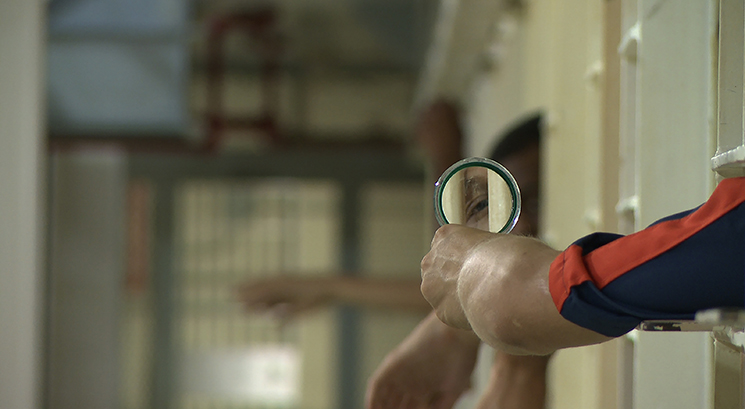Walls Turned Sideways
Artists Confront the Justice System
Aidekman Gallery, Tufts University Art Galleries • Medford, MA • artgalleries.tufts.edu • Through April 19, 2020

Tirtza Even, Natural Life, 2014–15, video installation, 77 minutes. Courtesy of the artist.
Walking into the Aidekman Gallery, you might miss one of the first works of the sweeping exhibition, Walls Turned Sideways: Artists Confront the Justice System. A collection of Jenny Polak’s site-respondent ICE Escape Signs (2018–2019) nearly blend into foyer walls. The visual language of these architectural plans and suggested escape routes of the gallery on institutional signage suggest how systems of incarceration are both everywhere and invisible, one of the key themes of this ambitious and thought-provoking exhibition.
Organized by Contemporary Arts Museum Houston and curated by Risa Puleo, Walls Turned Sideways features 34 contemporary artists working in a wide array of media, produced both in the studio and the public sphere. It is a broad and multifaceted survey that critiques the prison and court systems, thematically organized by the “ground” of the prison as institution and the “figure,” or the individuals who move through justice systems, from profiling, to arrest, processing, incarceration, and the poignantly ambiguous “exits.” These often invisible waypoints of incarceration are parsed with both nuance and realistic intensity.
Many artists plumb the archives to make visible both the statistical magnitude and individual experience of incarceration. Andrea Fraser’s Index graphs (2011, 2014) track the increasing wealth gap and rates of art acquisition, and delineate the correlative 700% increase in both museum and prison construction. On a more intimate scale, both Richard Kamler and art collective Lucky Pierre visualize the Texas records of inmates’ last meals in sculptural and video form. Quite a few works make use of video, including such iconic works as Coco Fusco and Guillermo Gómez-PeĖa’s Couple in the Cage and Suzanne Lacy’s Code 33, recordings of conversations between Oakland youth and the police after riots following the murder of Rodney King.
This exhibition takes its title from Angela Davis’s quote “Walls turned sideways are bridges,” and this critique of the justice system confronts us with the human cost of its many moving parts and pushes for reform. As such it is necessarily sprawling, ambitious in scope and scale, subject and media. Come prepared for deep consideration, and maybe with a friend for conversation and support.
